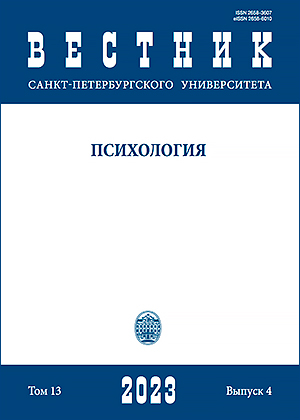The structure of basic life orientations: Ethno-cultural aspect (using the example of the Chinese version of the Subject-Object Orientations Questionnaire)
DOI:
https://doi.org/10.21638/spbu16.2023.404Abstract
Basic life orientations characterize the general objective of personality and depend on culture, traditions and mentality. Adequate psychological techniques are essential for cross-cultural studies. The aim of this study was to adapt the Russian-language Questionnaire of Subject- Object Orientations in Chinese. The following tasks were solved: equivalent translation of the questionnaire into Chinese; analysis of the discriminativity of items and the questionnaire as a whole; identification of the Chinese version factor structure; determination of its validity and reliability. The questionnaire was adapted among 1,471 Chinese students of the University of Guizhou Province (China). The survey of respondents was carried out according to six Chi- nese versions, in different samples. The adapted Chinese version of the questionnaire consists of 11 items included in three factors: 1) the courage to challenge difficulties; 2) the desire for inner harmony; 3) clarity of purpose in life. This structure of basic life orientations differs significantly from the four-factor structure inherent in Russians (three factors characterizing different aspects of the creative personal orientation in life situations, and the transsituational locus of control). According to the results of psychometric analysis, the Chinese version of the questionnaire provides assessments of statements on a 5-point Likert scale, unlike the Rus- sian version with an alternative choice of answers. The Chinese version of the questionnaire has high reliability and validity and can be used to study the life orientations of the Chinese. The use of this version will contribute to the development of scientific and cultural exchange between Russia and China.
Keywords:
basic life orientations, Questionnaire of Subject-Object Orientations, Chinese version, psychometric justification, factor structure of life orientations, cultural conditioning
Downloads
References
References
Downloads
Published
How to Cite
Issue
Section
License
Articles of "Vestnik of Saint Petersburg University. Psychology" are open access distributed under the terms of the License Agreement with Saint Petersburg State University, which permits to the authors unrestricted distribution and self-archiving free of charge.




